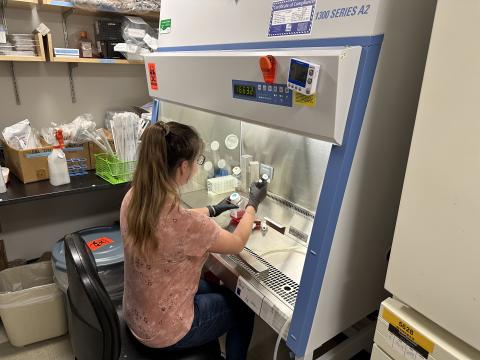
Nicole Benjamin ’24 is a genetics major who is spending the summer as a research assistant in Boston. Below, she shares her incredible experience — from developing new skills and strengthening her confidence as a researcher to the gratification of working on a genetic disease impacting her family.
Nicole received a stipend from COLSA’s SOAR Fund, which helped make the internship possible. The fund supports undergraduate students by providing stipends that may be used to supplement unpaid internships or pay for transportation to interviews and career events. The SOAR Fund accepts applications year-round. While all COLSA students are invited to apply, applicants with financial need are strongly encouraged.
Nicole Benjamin: I am interning as a research assistant for the Walker Laboratory, which is a part of the Center for Genomic Medicine at Mass General Hospital in Boston, Mass. The Walker Lab studies neurofibromatosis type 1 (NF1), a genetic disorder, and is working to further understand NF1 as well as identify therapeutic targets to treat this disorder.
Within the lab, I primarily work on the Posttranslational Modifications (PTM) and Interactome Project. We are working to edit our target gene through a technique known as "prime editing." Prime editing allows us to create insertions or deletions within a gene. By working with bacteria, I create the molecular "machinery" needed for prime editing. Furthermore, I am consistently analyzing and screening our mutant bacteria to ensure that the genetic modification is as we expected. Another responsibility I have is to keep cell lines alive. I culture Schwann Cells, a cell type that surrounds neurons, as they play a major role in neurofibromatosis. By culturing cells we are able to introduce mutations to them and observe how the cells respond. Through prime editing and studying Schwann Cells we are hopeful to find a therapeutic target to treat NF1.
In addition to my wet lab work I am responsible for keeping a thorough lab notebook with updated procedures. I also attend weekly lab meetings and learn about the research my lab partners are performing. I also have the wonderful opportunity of attending the Center for Genomic Medicine's weekly lunch seminars, where researchers present what they're working on. These meetings are really inspiring and I have learned so much by attending them.
Learn more about the research conducted by the Walker Lab.
COLSA: What attracted you to the position?
Nicole: When searching for internships, I wanted to find a place that would allow me to help people. During the school year I perform genetic research on plants, however, I was eager to get experience with human specimens as I eventually want to perform medical research. Thus, by being offered a position at the Walker Lab, I knew I would be able to work with human cells as well as be able to help individuals who have neurofibromatosis.
Furthermore, my cousin's nephew was born with NF1. He runs the nonprofit known as CureNFwithJack, which hopes to raise money to find a cure for NF. When I learned that I would be helping research neurofibromatosis, I was so excited to tell my cousin as I knew the research I would be preforming can help individuals such as her nephew. Although I was happy to be helping research this disorder, it means so much more than I am helping people I directly know.
Nicole: I am extremely proud of all the work I am doing in the laboratory as well as all of the knowledge and techniques I am learning. By committing my summer to research, I have learned so much that I am confident will help me succeed in my future education and career. I am confident I will be able to continue to use my knowledge and skills to help the greater community.
Nicole: One of the PhD candidates I work with told me for every task I perform either in the lab or academia, to ask myself ‘why?’ three times to become an expert. By being able to answer 'why,' I have found I’m able to explain theories behind each task I complete much more easily. I am going to continue asking myself 'why?' during my future studies as it has been extremely efficient in my learning this summer.
Nicole: This internship has impacted me by allowing me to get a taste of what my future career may be. Having participated in a research lab for the summer, I can confidently say that I enjoy preforming research and am glad I can help those who are suffering from genetic disorders. This experience has helped me direct where I see my future career heading.
Nicole: Network!! I never realized the importance networking was until I started searching for internships. Throughout high school and college I made connections with teachers, professors and other professionals. When it came time to search for internships I reached out to these individuals. I was lucky that one of my connections had a colleague in the research field who was looking for summer help. If it weren’t for reaching out to my network, I don’t think I would have had the opportunity to be where I am today.
Nicole: My favorite part of UNH is how easy it is to get involved. Throughout my time here, I have been a part of genealogy club as both a member and the president, social media chair of Phi Sigma Biological Sciences Honor Society, member of hall council, a residential assistant, and a research assistant for Dr. [Estelle] Hrabak. By being so involved at UNH I have met so many wonderful people.